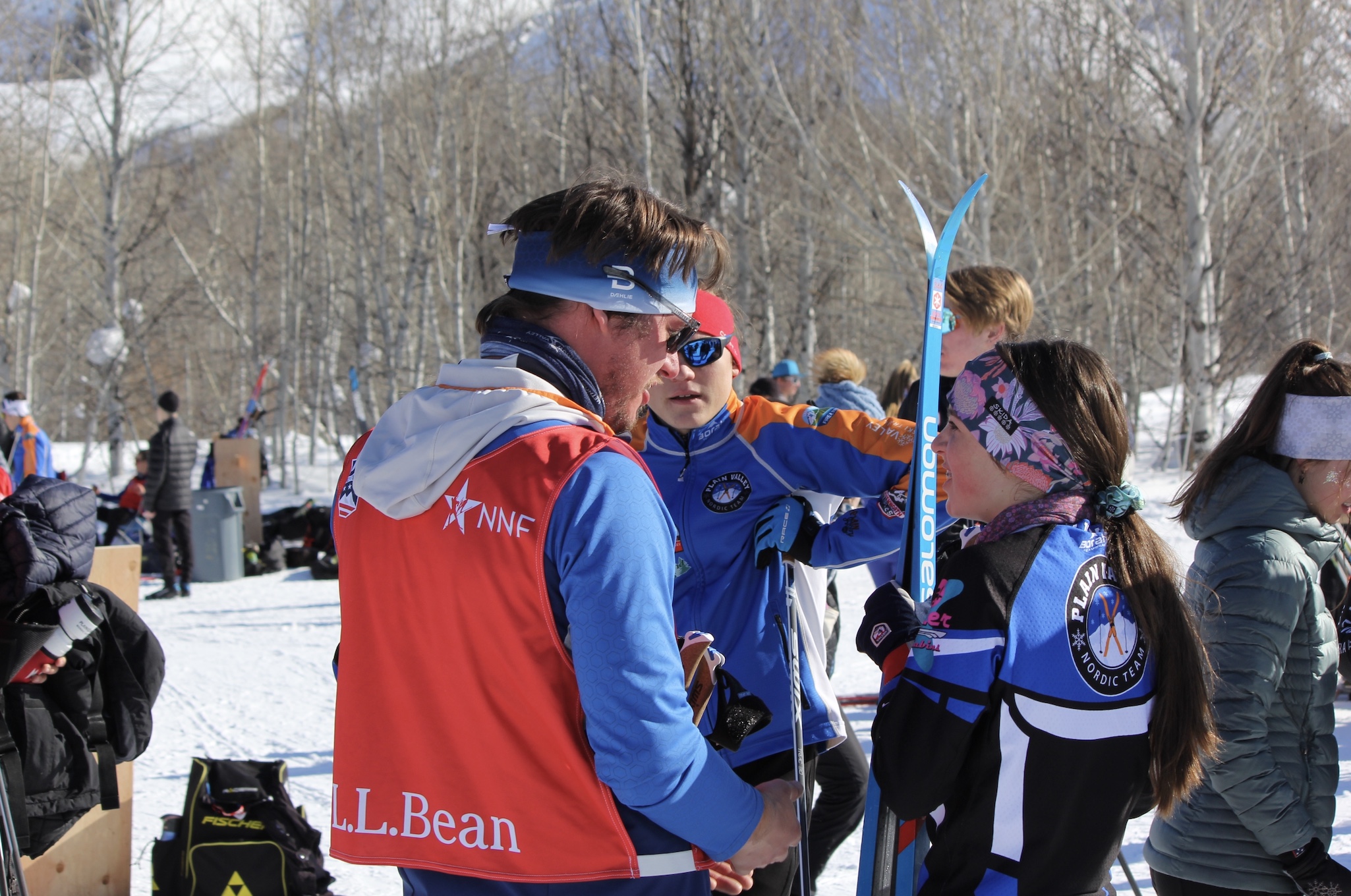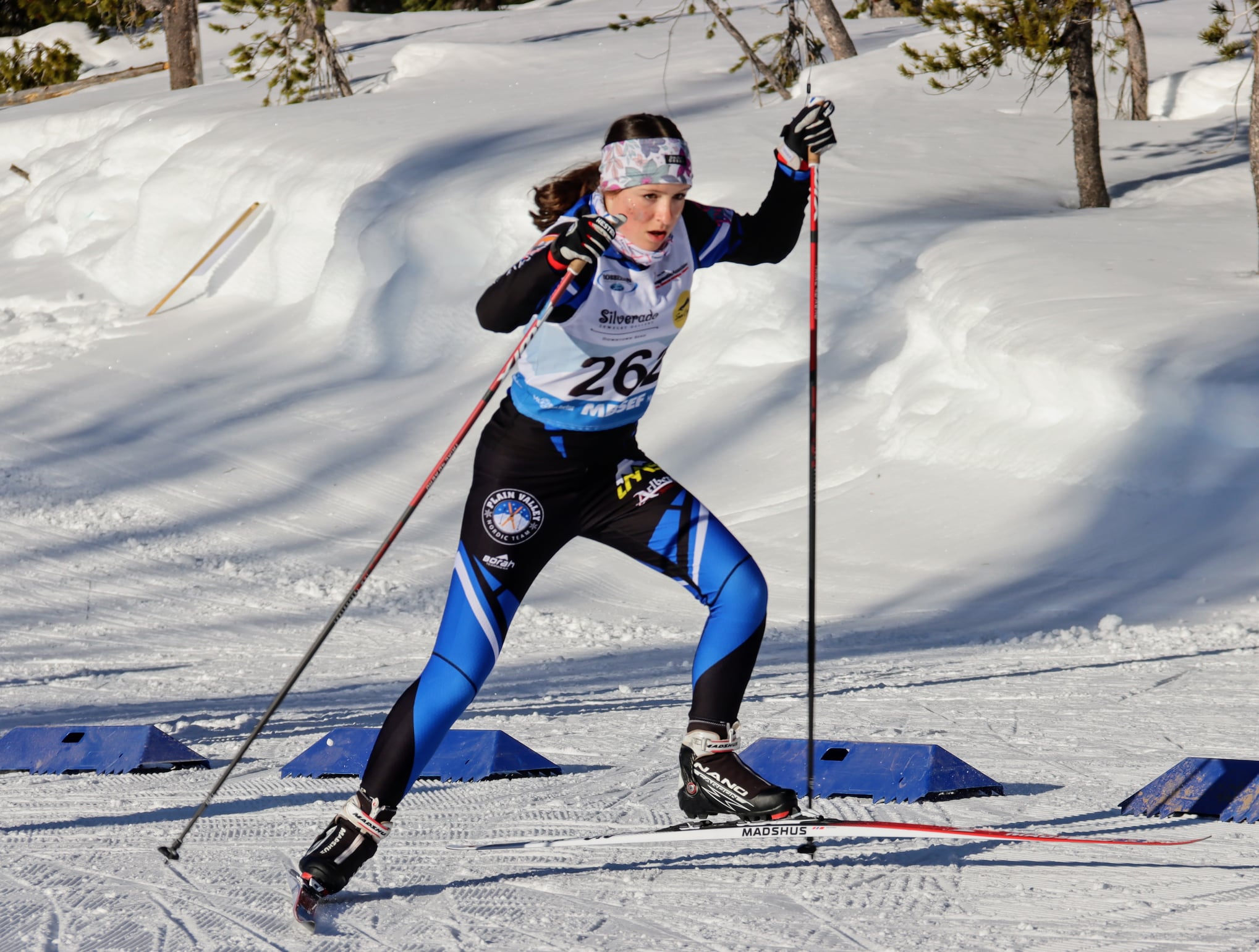As the 2022 Junior National Championships kick off, we’re featuring a small team from the Pacific Northwest who has sent eleven athletes to Minneapolis, MN, including the author of this story. To follow JN’s, you can view a livestream of races on the National Nordic Foundation (NNF) Facebook page, and find live results on SuperiorTiming.com.
By Isabel Menna
In March of 2021, in the tiny resort town of Jackson, Wyoming, the Intermountain Division Junior National Ski Team hosted the U.S. Western Youth Nordic Championships. As the first racer from the Plain Valley Nordic Team (PVNT) entered the start gate on day one of racing, the announcer, after initially mangling the racer’s name, asked over the PA: “Where the heck is Plain, Washington?” By the time a PVNT racer entered the start gate on the final day of the championships, however, that same announcer implored the crowd to “watch out for this young gal from the Plain team. These Plain kids know how to ski – and fast!”
PVNT had become the talk of the weekend, with two of its boys racing onto the podium each day, taking the top two steps on Saturday and placing five in the top-20 each day. The PVNT girls placed two in the top five each day, including on the podium Saturday.

(Photo: Plain Valley Ski Trails)
Plain, Washington, the postage stamp-sized hamlet of Leavenworth at the terminal end of the Chumstick Highway, is a mix of farms, church camps, homesteaders, and retirees from the West Side. Its hub, and one of fewer than a half-dozen commercial operations within it, is Plain Hardware, a modern-day trading post offering everything from lumber and nails to espresso and outdoor clothing. The Hardware Store’s owner Rob Whitten is the visionary and founder of Plain Valley Ski Trails, a 25 km network of cross-country skiing and snowshoeing trails. PVNT is the Trails’ affiliated ski racing team, also founded by Whitten in 2015.
PVNT is an all-but-unique organization in the United States. Like most junior ski teams, PVNT is open to any child in first through twelfth grade. Unlike most teams though, that means any child at all, not just those who can afford the equipment, fees, and travel. Expensive sports like cross-country ski racing have become pay-to-play in many instances, meaning just that: only those who can pay, can play.
PVNT was organized intentionally to buck that unfortunate trend. The majority of children and teenagers on the Plain team come from modest income families. Nonetheless, for nominal tuition, waived in many cases, every racer is provided with year-round, high-level coaching, practice and race skis (both skate and classic), roller skis (both skate and classic), poles, boots, wax, race suits, team coats, race fees, travel in team vans, and room and board for away races and camps. As racers move into the oldest age group, they are asked to bear some of the financial burden but only if their family can afford to do so.
The PVNT model, devised by Whitten, is not uncommon from those found in some European countries, though the source of funding is slightly different. The base, and largest portion, of PVNT’s funding is provided by one hundred percent of the income generated from sales of passes to the Trails.
The self-effacing Whitten formulated the model as a way of giving back to the community. PVNT Director Chistie Saugen says “it’s as simple as Rob loving cross country skiing, ski racing and his community, which, in turn, has inspired many in the wider community. Volunteer hours, grants, and donations from supporters, including at the team’s annual auction and from the Plain Valley Adventure Women (a program specifically organized to help financially support the race team), also provide essential financial support to PVNT, without which many of the kids might not otherwise spend winters outside being healthy and happy with friends and teammates.”

(Photo: Isabel Menna)
While most of the team lives in the Plain Valley, a significant percentage, particularly in the older age group, hails from Wenatchee, Leavenworth, and even Seattle. The main draw for these racers is the coaching staff, headed by Pierre Niess, who grew up skiing in the French Alps and came to PVNT from the staff of the Nordic ski program at the University of New Mexico. After hearing of an opening for a head coach at what was described to him as an “experimental, fresh approach to the typical ski racing program,” Niess decided to take a chance. Since then, he and Whitten have not looked back or taken a breath.
The pair began with a roster of five, with few, if any, knowing the difference between skate and classic skiing, let alone how to race. Inspired by their love of ski racing and the enthusiasm of the kids, the two planned big and methodically, though admittedly with no shortage of trial-and-error. They brought their expertise to bear, enlisted and trained volunteers, improved and expanded the trails and just grounded out the hours, year after year, to build a competitive team. Today, they oversee a burgeoning, three-tiered program of over one hundred skiers.
Niess and Whitten’s success is not limited to numbers though. A repeat performance at Western Youth Championships in McCall, Idaho, at the end of next month, is more than plausible, as is the team sending in March, to the United States Nordic Junior National Championships in Minnesota, more than ten of its racers.
As of the first of this year, Whitten, who served as the executive director of the team from its inception, passed those reigns to the former volunteer coordinator, administrator, registrar and mother of three on the team, Saugen. Whitten will continue with the team as an advisor and volunteer. He will also continue his stewardship of the trail system complex, which crosses more than a score of privately held parcels of land. The relationships Whitten has honed with the generous landowners is fundamental to the team’s success, not only as its financial base, but for its training grounds.
On those trails, in addition to his expertise, Niess brings to bear his view of PVNT as an “educational program.” While hesitant to state a personal coaching philosophy, per se, he did continue by saying: “We use skiing as a tool in a competitive environment to help prepare children to be the best version of themselves in a competitive world.” Niess went on to explain that he tries “to find out what each individual wants – what their goal in the sport is – and then guide them toward it, all the while recognizing that we are dynamic as people and goals change over time.”
As to the sport itself, Niess feels that cross country ski racing has a nuanced appeal: “Because our race season is comparatively short, that makes it precious. Cross country skiing has the benefit of no shackles. Because of the long ‘off’ season, we use a wide diversity of cross-training, all to the benefit of skiers in the winter. This versatility in training, I believe, is unparalleled in all of sport.”
Niess’ approach to coaching is employed and adapted throughout the program. One of the first coaches to join on under Niess is the development team head coach, Angie Stay. Stay, in concert with Niess, reflected that she sees “sports and competition as way to make children better as individuals, and better members of their community. I love that these kids are part of something bigger than themselves.”
Stay went on to explain that most of the skiers in the development layer of the program are quite young. “So, we train through play. They learn to ski almost without knowing it. It’s so rewarding to see the vast improvement in not just ability but attitudes and confidence from the first day of practice, at which many just want to sit in the snow, to the end of the season when they are all energetically and enthusiastically playing sharks and minnow or capture the flag on their Nordic skis!”
At all stages of the PVNT children’s development as skiers and ski racers, director Saugen is most happy that they are enjoying themselves. “Look,” she says, “cross country skiing is fun and that is great in itself. More importantly though, these kiddos have fun being together. In addition to skiing, they run together, bike together, [and] alpine ski together.”
On the snow, “we have kids who range from those who simply enjoy being physically active in the winter to those who will go on to race at Junior Nationals, in college or more. Yet, they all cheer each other on no matter the goal. It’s not about competing against each other, but with each other.” Off the snow, “our goal as an organization is to allow any kid who wants to be on this team to be on the team, no matter their family’s ability to pay. Affordability is the centerpiece of this program. With that in mind, I would like to thank all our pass-holders, supporters, and landowners for embracing this mission and remind each of them that they are integral to the healthy, happy development of our kids.”
Saugen concluded by remarking that “our growth in numbers and goals come with a big price and we are all working awfully hard to make it happen now and in the future. Fortunately, we are lucky to have such a wonderful community and one of the best coaches around, in my opinion.”

It is not just Saugen’s opinion. Last season, Niess was named the Pacific Northwest Ski Association’s (PNSA) Outstanding Nordic Coach of the Year. Whitten received PNSA’s Norrie Lamson Award “for outstanding service to juniors and [junior] race programs over a period of years.”
PVNT, the little team that could, has come a long way in a short time and is making goals come true for children throughout the Valley.



